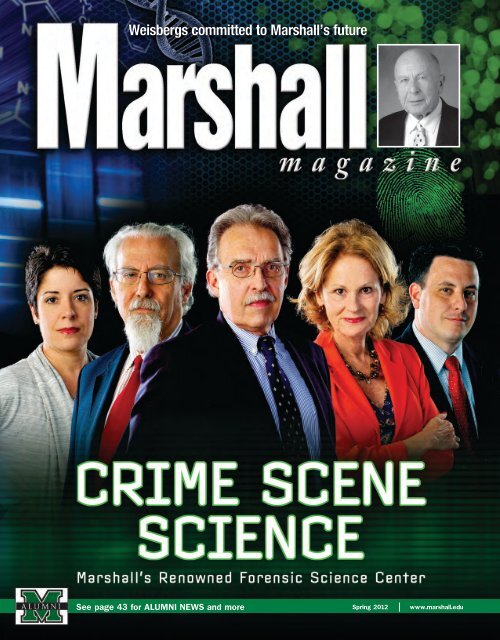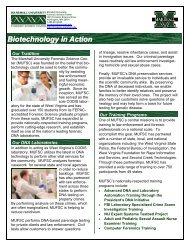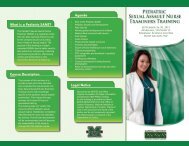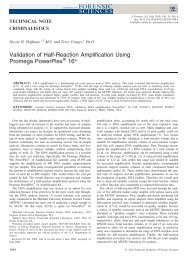Cover Story - Marshall University Forensic Science Center
Cover Story - Marshall University Forensic Science Center
Cover Story - Marshall University Forensic Science Center
You also want an ePaper? Increase the reach of your titles
YUMPU automatically turns print PDFs into web optimized ePapers that Google loves.
Weisbergs committed to <strong>Marshall</strong>’s future<br />
See page 43 for ALUMNI NEWS and more<br />
Spring 2012 www.marshall.edu
cover story<br />
4 SPRING 2012
<strong>Marshall</strong>’s renowned<br />
<strong>Forensic</strong> <strong>Science</strong> <strong>Center</strong><br />
offers areas of emphasis in<br />
Crime Scene Investigation,<br />
Digital <strong>Forensic</strong>s, DNA<br />
Analysis and <strong>Forensic</strong><br />
Chemistry.<br />
Premiering on CBS television in 2000, CSI: Crime<br />
Scene Investigation follows crime analysts as they<br />
use DNA and other scientific evidence to solve<br />
grisly crimes. The show has become the mostwatched<br />
TV drama in the nation and has inspired two<br />
spin-offs and a host of copycats. It should surprise no<br />
one that CBS has renewed CSI for a 13th season.<br />
And it’s perhaps not surprising, too, that more and<br />
more young people are eyeing forensic science as a<br />
career, making it one of the hottest subjects on today’s<br />
campuses. According to USA Today, more than 130 of<br />
the nation’s college and universities now offer forensic<br />
science programs. However, the newspaper notes<br />
that only a handful of those programs are accredited.<br />
By James E. Casto<br />
Photos by Rick Lee<br />
SPRING 2012 5
Cutline cutline cutline<br />
The <strong>Marshall</strong> <strong>Forensic</strong> <strong>Science</strong> <strong>Center</strong> works with the West Virginia State Police to compile a database of criminal offenders using<br />
DNA samples. The DNA profiles created in the <strong>Marshall</strong> laboratory are also forwarded to the FBI for inclusion in a national database.<br />
Among them are the programs at the <strong>Marshall</strong><br />
<strong>University</strong> <strong>Forensic</strong> <strong>Science</strong> <strong>Center</strong>.<br />
<strong>Marshall</strong>’s programs actually pre-date the debut of<br />
CSI. The school accepted its first class of forensic science<br />
students in 1995. Since then, the MU <strong>Forensic</strong><br />
<strong>Science</strong> <strong>Center</strong> and its programs have grown dramatically<br />
in both size and reputation. The center’s DNA<br />
laboratory and training facilities attract eager students<br />
and law enforcement personnel from across the country.<br />
Digital forensics and analytical chemistry are also<br />
important elements of the center’s mission.<br />
6 SPRING 2012<br />
In its early years the center made the old Fairfield<br />
Stadium football locker room its home, transforming it<br />
into a state-of-the-art, human identification DNA laboratory.<br />
Later, a modern addition provided additional<br />
space, and in 2009 a three-story annex was opened.<br />
The unfinished academic section remains a work in<br />
progress. The center also utilizes a university-owned<br />
old house in the 1500 block of Fifth Avenue. The<br />
handsome three-story brick structure provides a setting<br />
where students can practice crime scene investigation<br />
techniques.
The center has “two major components,” said Dr. Terry W.<br />
Fenger, its founding director. “One is our master’s degree program<br />
in forensic science, and the other is our working laboratories,<br />
which are research and testing laboratories.”<br />
On the academic side, the center itself long has been accredited,<br />
but Fenger said the center recently received a second accreditation<br />
in digital forensics.<br />
“What makes this newest accreditation really special is that we’re<br />
the first academic program in the country to receive it,” he said.<br />
“So we’re going to be the model for other campuses.”<br />
The master’s degree program in forensic science includes a five-<br />
<strong>Forensic</strong><br />
Scholarship<br />
Established<br />
The newly established Paul H. and<br />
Dixie O. Nicely Scholarship Fund is<br />
the first scholarship fund to be set up<br />
for the <strong>Marshall</strong> <strong>University</strong> <strong>Forensic</strong><br />
<strong>Science</strong> Graduate Program and its students.<br />
Founded by Tammy White, Esq.,<br />
in honor of her parents, the scholarship<br />
is for West Virginia and metro-area students<br />
with high academic performance<br />
and financial need.<br />
MU <strong>Forensic</strong> <strong>Science</strong> <strong>Center</strong> Director<br />
Terry W. Fenger praised the Nicely<br />
family for identifying the need to provide<br />
financial support to forensic science<br />
students and taking the initiative<br />
to create the scholarship.<br />
“The family has followed the development<br />
of our programs for many years,<br />
and they understand the value of forensic<br />
science and the impact it has on the<br />
greater good in society,” he said.<br />
SPRING 2012 7
With the first university-affiliated Combined DNA Index System (CODIS) laboratory in the nation, the <strong>Marshall</strong> <strong>University</strong> <strong>Forensic</strong><br />
<strong>Science</strong> <strong>Center</strong> is well-equipped to handle DNA sample requests from both local and national law enforcement agencies.<br />
semester core curriculum, with students able to select<br />
from one or more areas of emphasis: Crime Scene<br />
Investigation, Digital <strong>Forensic</strong>s, DNA Analysis and<br />
<strong>Forensic</strong> Chemistry.<br />
“What’s unique is the students can specialize in all<br />
four areas and graduate on time,” said Dr. Pamela J.<br />
Staton, an associate professor at the center.<br />
Jason Chute, technical leader in the DNA lab, said<br />
the center’s students aren’t just given textbook lessons.<br />
“We go beyond the textbook,” he said, “to examine<br />
examples of real cases that require the students to<br />
develop problem-solving skills.”<br />
Over the years, the center has made major strides<br />
and today is on the cutting edge of forensic technology.<br />
Training for forensic science professionals is a big part<br />
of the center’s mission: more than 1,800 working forensic<br />
science professionals from 48 states have received<br />
training at the <strong>Marshall</strong> facility or by <strong>Marshall</strong> trainers<br />
at other locales.<br />
“Ours was the first university-affiliated Combined<br />
DNA Index System (CODIS) Laboratory in the coun-<br />
8 SPRING 2012<br />
try,” Fenger said. CODIS is a national database that<br />
compiles the DNA profiles of criminal offenders.<br />
Samples are taken from West Virginia offenders and<br />
sent to the <strong>Marshall</strong> lab. The lab creates a distinct DNA<br />
profile for each and sends it to the State Police, who<br />
then review the profile, enter it into the state database<br />
and forward it on to the FBI for inclusion in the national<br />
database. Thus, when a crime occurs in which DNA<br />
is discovered, that sample can be compared to the state<br />
and national databases, perhaps identifying the culprit.<br />
The <strong>Marshall</strong> center’s crime-fighting work extends<br />
far beyond West Virginia’s borders. A number of law<br />
enforcement agencies nationwide have turned to the<br />
center for help. In a project just completed, the center<br />
extended a helping hand to the New Orleans Police<br />
Department, processing a backlog of more than 800<br />
untested sexual assault kits, many of them damaged by<br />
Hurricane Katrina.<br />
Katrina left the department’s evidence room and<br />
DNA lab under water. The evidence room already<br />
housed a backlog of hundreds of unprocessed rape kits,
some dating back to the 1980s.<br />
Many of the kits were damaged<br />
by the water that flooded the<br />
evidence room, and high water<br />
also left the department’s DNA<br />
lab unusable.<br />
Mark Nelson, program manager<br />
with the National Institute<br />
of Justice, said when his agency<br />
was contacted about providing<br />
New Orleans help, he immediately<br />
thought of the <strong>Marshall</strong><br />
<strong>Forensic</strong> <strong>Science</strong> <strong>Center</strong><br />
because the center had successfully<br />
processed untested rape<br />
kits for the Los Angeles County<br />
Sheriff’s Office.<br />
According to Commander<br />
Paul Noel of the New Orleans Police Department, the<br />
work done at <strong>Marshall</strong> has already resulted in two rape<br />
convictions with more cases still to go to trial.<br />
The center also does<br />
DNA testing for forensic<br />
paternity/relationship<br />
cases, which can include<br />
incest, sexual assault<br />
involving pregnancy,<br />
molestation of a minor<br />
resulting in pregnancy,<br />
DNA identification of<br />
infants with unknown<br />
mothers and the identification<br />
of human remains.<br />
One of the center’s<br />
true showpieces is its<br />
new digital forensics lab.<br />
The lab has sophisticated<br />
computer hardware and<br />
software that enable law<br />
enforcement to analyze and preserve digital evidence<br />
that may be lurking on suspects’ computers and cell<br />
phones. Digital evidence is now part of many criminal<br />
“We go beyond the<br />
textbook to examine<br />
examples of real cases<br />
that require the<br />
students to develop<br />
problem-solving skills.”<br />
-Jason Chute<br />
Graduates of <strong>Marshall</strong>’s cutting-edge forensic science program are in high demand at crime laboratories across the country. The handson<br />
experience forensic science students gain while at <strong>Marshall</strong> provides a seamless transition into careers after graduation.<br />
SPRING 2012 9
cases but is especially prevalent in child pornography<br />
investigations. State Police Cpl. Robert J. Boggs uses the<br />
MU computers to determine the Internet addresses of<br />
individuals who appear to be trafficking in child porn<br />
via computer. Once a suspect is identified, a search warrant<br />
is obtained and the computer in question is taken<br />
into custody for forensic examination.<br />
Boggs said many other crimes, from murder to<br />
embezzlement, can also present a need for the forensic<br />
examination of computer hard drives and cell phones.<br />
According to Fenger, <strong>Marshall</strong> is one of the few<br />
schools in the nation training students in digital forensics.<br />
Part of the challenge, he said, is that the field is one<br />
that’s changing so rapidly, “it’s like the train is pulling<br />
out of the station at 100 miles per hour and we’re trying<br />
to catch it.”<br />
“When authorities go into a house to check a computer,<br />
they don’t know if they’re going to find one that’s<br />
several years old or one that’s so new they’ve never seen<br />
anything like it before,” he said.<br />
Fenger said he’s especially proud of the fact that<br />
10 SPRING 2012<br />
the center is “staffed by West Virginians. These are<br />
people who did not have to leave West Virginia to find<br />
technology-based jobs.”<br />
Meanwhile, <strong>Marshall</strong> forensic graduates are in high<br />
demand at crime laboratories across the country.<br />
“Over the past five years, our graduates have gone<br />
to work in crime labs in 24 states and the District<br />
of Columbia,” said Staton, who noted that federal<br />
law enforcement agencies employing <strong>Marshall</strong> forensic<br />
grads include the FBI, DEA, ATF, Secret Service and<br />
others.<br />
Dr. J. Graham Rankin, a veteran professor at the<br />
center, said that when he talks to crime lab directors<br />
elsewhere, “many comment on how well our graduating<br />
students are doing working in their labs and wish they<br />
could hire more of our grads.”<br />
James E. Casto was a reporter and editor at The<br />
Herald-Dispatch for more than 40 years before he retired<br />
in 2004.
SPRING 2012 53




![Marshall Information Security and Digital Evidence [MISDE]](https://img.yumpu.com/18622815/1/190x146/marshall-information-security-and-digital-evidence-misde.jpg?quality=85)

